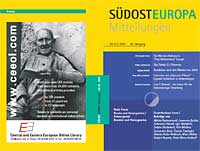Das Türkei-EU-Dilemma
The Turkey-EU Dilemma
Author(s): Heinz-Jürgen AxtSubject(s): Politics / Political Sciences
Published by: Südosteuropa Gesellschaft e.V.
Keywords: EU accession negotiations with Turkey; European Constitution Treaty; the Cyprus problem; EU enlargement;
Summary/Abstract: The European Union is confronted with a dilemma when it comes to the accession negotiations with Turkey. As “Eurobarometer” surveys show, people are becoming sceptical about the EU enlargement more and more. That becomes evident with respect to the ten new member states that joined the Union in May 2004, but much more as far as Turkey is concerned. On the other hand, the referenda on the European Constitution Treaty in France and the Netherlands with their negative results have made clear that many EU citizens view the deepening of the integration process dispassionately. The EU has – theoretically spoken – three options how to handle the negotiation process with Turkey: 1) negotiations could be postponed, 2) negotiations could be carried out with the intention to let Turkey become a full member, 3) the proceedings could start with the aim to implement a full membership status but could end with a “membership minus” status. Option no. 1 would satisfy people being sceptical that Turkey’s membership is a good idea. However, the EU would loose credibility not only in Turkey but also internationally, as promises would not be kept. Turkey would distance itself from Europe without having a realistic alternative of geopolitical orientation. Its willingness to help the EU with the Cyprus problem would decline. Option no. 2 would be the optimum for Turkey. The EU, on the other hand, would face severe problems such as potential mass migration, financial strains, decision making and cultural challenges by a Muslim society – the concerns expressed by critics of the Turkish membership perspective. Option no. 3 could be a compromise, enabling flexible solutions in the context of an integration process, which may alter the EU itself. Sceptics among EU citizens would feel understood by policy makers. This option, however, meets the strongest resistance by Turkey, resulting from domestic pressure.
Journal: Südosteuropa Mitteilungen
- Issue Year: 2005
- Issue No: 04-05
- Page Range: 16-23
- Page Count: 8
- Language: German
- Content File-PDF

